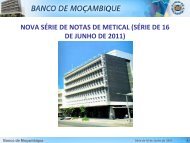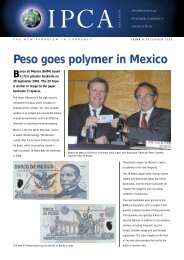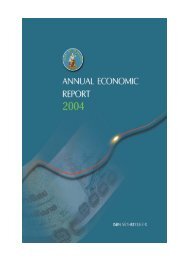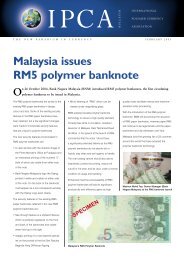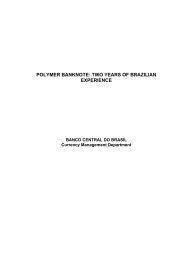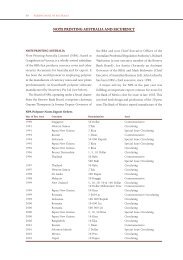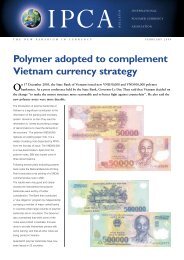ANNUAL REPORT 2008 - Polymer Bank Notes of the World
ANNUAL REPORT 2008 - Polymer Bank Notes of the World
ANNUAL REPORT 2008 - Polymer Bank Notes of the World
Create successful ePaper yourself
Turn your PDF publications into a flip-book with our unique Google optimized e-Paper software.
The market for short-term paper in Europeis <strong>of</strong> a largely domestic nature. The STEPinitiative, pursued by market participantsunder <strong>the</strong> auspices <strong>of</strong> <strong>the</strong> European <strong>Bank</strong>ingFederation and ACI – The Financial MarketsAssociation, and steered by <strong>the</strong> STEP MarketCommittee, has addressed this gap in financialintegration through <strong>the</strong> development <strong>of</strong> a coreset <strong>of</strong> commonly agreed market standardsand practices, with which market participantscomply on a voluntary basis.The Eurosystem has supported <strong>the</strong> STEPinitiative since its inception in 2001by facilitating interaction among marketparticipants, contributing to <strong>the</strong> development<strong>of</strong> <strong>the</strong> STEP Market Convention and raisingpublic awareness regarding <strong>the</strong> initiative.Following <strong>the</strong> successful launch <strong>of</strong> <strong>the</strong> STEPmarket in June 2006, <strong>the</strong> Eurosystem hascontinued to contribute to <strong>the</strong> initiative in twoways. First, <strong>the</strong> ECB provides statistics on <strong>the</strong>STEP market. Second, <strong>the</strong> Eurosystem assists<strong>the</strong> STEP Secretariat in <strong>the</strong> labelling <strong>of</strong> STEPpaper. This second measure is a temporaryarrangement which will expire in June 2010.The STEP Market Committee has launcheda review <strong>of</strong> <strong>the</strong> STEP Market Convention,with <strong>the</strong> aim <strong>of</strong> making its applicationeasier for a larger number <strong>of</strong> markets from atechnical point <strong>of</strong> view, while maintaining oreven enhancing <strong>the</strong> standards <strong>of</strong> <strong>the</strong> MarketConvention. The ECB welcomes such areview. First, as markets evolve, <strong>the</strong> MarketConvention must be adjusted accordingly.Second, it is a good opportunity to take stock<strong>of</strong> <strong>the</strong> processes and procedures applied since<strong>the</strong> start <strong>of</strong> <strong>the</strong> STEP market in June 2006 andto make any necessary improvements to <strong>the</strong>Market Convention.The ECB produces daily statistics on yieldson new issues <strong>of</strong> euro-denominated STEPsecurities, as well as monthly volumes <strong>of</strong> STEPdebt securities. Despite <strong>the</strong> distressed marketconditions, <strong>the</strong> total outstanding amount <strong>of</strong>STEP debt securities increased by 24% (year onyear) in <strong>the</strong> fourth quarter <strong>of</strong> <strong>2008</strong>.ADVICE ON THE LEGISLATIVE AND REGULATORYFRAMEWORK FOR THE FINANCIAL SYSTEM ANDDIRECT RULE-MAKINGThe Eurosystem regularly contributes to <strong>the</strong>development <strong>of</strong> <strong>the</strong> EU legislative and regulatoryframework by providing advice on <strong>the</strong> mainpolicy initiatives under way.Activity with regard to financial supervision in<strong>the</strong> EU focused in <strong>2008</strong> on <strong>the</strong> follow-up <strong>of</strong> <strong>the</strong>review <strong>of</strong> <strong>the</strong> Lamfalussy framework, to which<strong>the</strong> Eurosystem contributed (see Section 2<strong>of</strong> this chapter). Fur<strong>the</strong>rmore, as part <strong>of</strong> itsadvisory role in accordance with Article 105(4)<strong>of</strong> <strong>the</strong> Treaty, <strong>the</strong> ECB regularly provides adviceon <strong>the</strong> legislative proposals <strong>of</strong> <strong>the</strong> EuropeanCommission (see also Section 2).The ECB provided advisory input on issuesrelated to <strong>the</strong> integration <strong>of</strong> securitiessettlement systems and <strong>of</strong> payment systems.In particular, <strong>the</strong> ECB was closely involvedin <strong>the</strong> work relating to <strong>the</strong> “Code <strong>of</strong> Conductfor Clearing and Settlement”. The code aimsto foster competition on <strong>the</strong> basis <strong>of</strong> pricetransparency, access and interoperability, andservice unbundling and accounting separation.Given that <strong>the</strong> code is a self-regulatory tool, astrict monitoring mechanism has been set up toensure that all <strong>the</strong> measures are implementedproperly and on time. The mechanism relieson external auditors and an ad hoc MonitoringGroup composed <strong>of</strong> <strong>the</strong> European Commission,CESR and <strong>the</strong> ECB. The Monitoring Group metfour times in <strong>the</strong> course <strong>of</strong> <strong>2008</strong>. The ECB and<strong>the</strong> European Central Securities DepositoriesAssociation conducted an analysis on pricetransparency and provided suggestions on howto improve price comparability.As <strong>the</strong> code <strong>of</strong> conduct ultimately aims toestablish freedom <strong>of</strong> choice, it needs to becomplemented by <strong>the</strong> full removal <strong>of</strong> <strong>the</strong>“Giovannini barriers” to efficient clearing andsettlement (named after <strong>the</strong> group that identified<strong>the</strong>m in 2001), which result from differences intechnical standards and business practices, legaluncertainty, and differences in tax procedures.The ECB continued to participate in <strong>the</strong> Clearing160 ECBAnnual Report<strong>2008</strong>



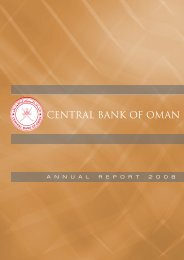
![KNOW YOUR NEW GIBRALTAR BANKNOTES - [Home] bThe/b](https://img.yumpu.com/50890985/1/184x260/know-your-new-gibraltar-banknotes-home-bthe-b.jpg?quality=85)
![PAPUA NEW GUINEA - [Home] - Polymer Bank Notes of the World](https://img.yumpu.com/49758743/1/190x143/papua-new-guinea-home-polymer-bank-notes-of-the-world.jpg?quality=85)

